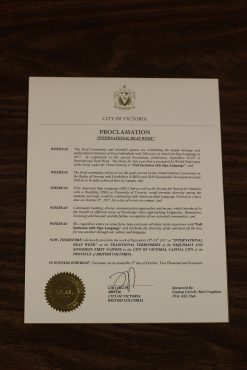
A proclamation, signed by Victoria mayor Lisa Helps, designating an official Deaf Awareness Week. Photo by Sarah Lazin, Editor-in-Chief
On Oct. 6, members and allies of the deaf community gathered in the Student Union Building for an afternoon celebrating the 200th anniversary of American Sign Language (ASL), organized by the Society For Students with a Disability (SSD).
The event featured a talk on ASL and deaf history, an ASL immersion workshop, a panel on deaf community and identity, and a musical performance. It concluded with a screening of the deaf movie Versa Effect over free dinner.
The festival was run entirely in ASL with English translation, including the film, although interpreters were asked not to translate during the immersion workshop.
Across the globe, there are 70 million deaf people and over 300 sign languages. Sign language is known best for the linguistic use of hand signs, although expressions and posture also play a crucial role. Canada has two national sign languages, ASL and Langue des Signes Québécoise (LSQ), but unlike many other countries, fails to federally recognize them.
“In the past 200 years for ASL, it’s been an incredible journey,” said Ravi Coughlan, Chairperson of the SSD. “Deaf people have had a struggle for their accessibility to communication . . . Really, sign language is the best mode of communication — better than lip reading, because [you] lose a lot of information and [have] miscommunication.”
Mayor Lisa Helps signed a proclamation on Oct. 5 in recognition of the ASL celebration at UVic and the International Week of the Deaf, which had occurred a week prior. The proclamation, sponsored by the UVic ASL club, was presented at the festival to a room full of enthusiastic — although completely silent — applause.
“We, regardless where we come from; hope everyone will share in the experience with ‘Full Inclusion with Sign Language’ and celebrate the diversity, pride and meet all the love for one another through our culture and language,” the proclamation reads.
Speakers and panelists at the festival discussed widespread job discrimination, the dangers of cochlear implants, and how the lack of qualified interpreters hinders everyday interactions.
“Our goal for the festival today is exposure [to] the UVic community at large . . . [to] have them more aware about deafness and what our struggles are and our rights to have language,” Coughlan said at the event.
One challenge to those rights, discussed at length by the panel, was a lack of accessibility to ASL. In the late nineteenth and early twentieth century, deaf schools were shut down and the teaching of ASL outlawed.
“It was very similar to Social Darwinism, because [sign language] was seen as something that was lesser, something that was animalistic, and people that could speak were more civilized,” explained Coughlan. “That’s why they tried to teach oralism (forms of communication like speech and lip reading).”
For self-identified members of the deaf community like Coughlan and Sue Forward, who grew up oral and later learned ASL, sign language is part of their identity and culture.
A highlight of the event for Forward, who traveled from Nanaimo to attend, was “meeting deaf people, hearing their stories, learning sign language, and getting involved in the deaf culture — because I’m learning myself, too.”
Coughlan recommends all students learn more about the deaf community at UVic and in the greater community.
“We don’t need Superman to come in and save us, and we don’t need helpers, but we need allies,” said Coughlan. “I think that it’s time for us to feel that the community recognizes ASL as a language.”
To anyone interested in learning more about ASL and deaf awareness, Coughlan recommends joining the SSD or UVic ASL club. In addition to ASL classes offered at UVic, he suggests the online ASL Student Network as a resource for learning ASL.
You can visit this network at aslstudentnetwork.com






